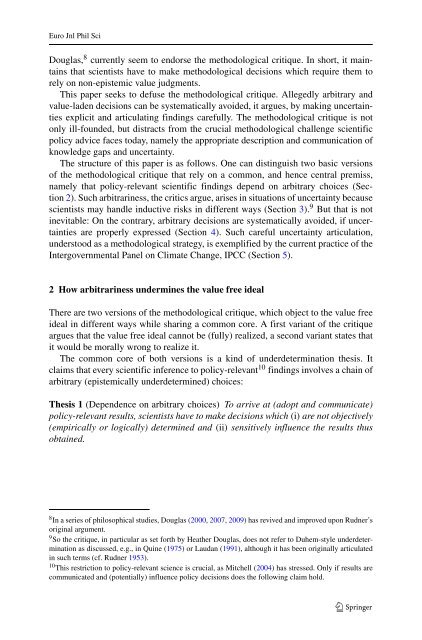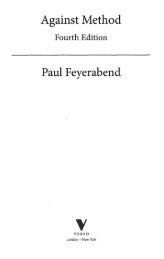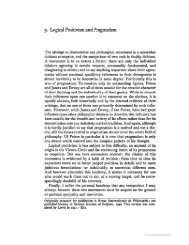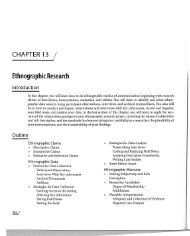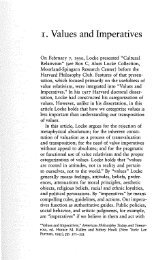EuroJnlPhilSciHowever, <strong>the</strong> <strong>ideal</strong> <strong>of</strong> <strong>value</strong> <strong>free</strong> science has been at <strong>the</strong> heart <strong>of</strong> various controversieswhich have raged since at least Max Weber’s publications and involved philosophersand social scientists alike. More recently, philosophers have re-articulated andsharpened two types <strong>of</strong> criticism which I shall term <strong>the</strong> “semantic critique” and <strong>the</strong>“methodological critique”. 1 The semantic critique, which was anticipated by Weber(1949, pp. 27–38), is, for example, set forth by Putnam (2002) and Dupré (2007). Itclaims that normative and factual statements are irreducibly interwoven because <strong>of</strong><strong>the</strong> existence <strong>of</strong> thick concepts. 2 That’s why science cannot get rid <strong>of</strong> <strong>value</strong> judgments;as a consequence, <strong>the</strong> <strong>ideal</strong> <strong>of</strong> <strong>value</strong> <strong>free</strong> science is allegedly unrealizable.The methodological critique dates back to a seminal paper by Rudner (1953), whichincited a debate in <strong>the</strong> 1950s involving, amongst o<strong>the</strong>rs, Jeffrey (1956) and Levi(1960). Various philosophers <strong>of</strong> science, including Philip Kitcher, 3 Helen Longino, 4Torsten Wilholt, 5 Eric Winsberg, 6 Kevin Elliott 7 and, most forcefully, Hea<strong>the</strong>r1 A third, ra<strong>the</strong>r empirical critique, challenges <strong>the</strong> <strong>ideal</strong> <strong>of</strong> <strong>value</strong> <strong>free</strong> science in regard <strong>of</strong> its (potential)harmful side-effects. Adopting <strong>the</strong> <strong>ideal</strong> in scientific policy advice, <strong>the</strong> argument goes, might have <strong>the</strong>effect that worse decisions are eventually being taken or that scientific advice, for being too nuanced orcareful, is completely ignored in policy making; see for example Cranor (1990, p. 139) or Elliott (2011,pp. 55–80, in particular pp. 67–68). Both Cranor and Elliott, though, don’t provide detailed empiricalevidence to support <strong>the</strong> claim that providing <strong>value</strong>-<strong>free</strong> advice is socially harmful. Moreover, Elliott reconstructs<strong>the</strong> argument as a <strong>defence</strong> <strong>of</strong> <strong>the</strong> methodological critique (ibid., pp. 63–64, 68). I don’t agree: Ifit’s really harmful to give <strong>value</strong>-<strong>free</strong> advice, that’s clearly a reason in its own not to do it—quite independently<strong>of</strong> any fur<strong>the</strong>r sophisticated, methodological reasoning. Moreover, stressing that <strong>value</strong>-<strong>free</strong> adviceis harmful does not invalidate <strong>the</strong> refutation <strong>of</strong> <strong>the</strong> methodological critique advanced below. This said, <strong>the</strong>charge that adopting <strong>the</strong> <strong>value</strong>-<strong>free</strong> <strong>ideal</strong> might be socially harmful—at least in some contexts and undercertain conditions—has to be taken serious and calls for fur<strong>the</strong>r philosophical and empirical investigation.2 A term coined by Williams (1985).3 See Kitcher (2011, pp. 31–40). Besides endorsing <strong>the</strong> methodological critique reconstructed in this paper,Kitcher sets forth a fur<strong>the</strong>r argument against <strong>value</strong> <strong>free</strong>dom which is based on <strong>the</strong> pervasiveness <strong>of</strong> socalledprobative <strong>value</strong>s in scientific inquiry (Kitcher 2011, pp. 37–40). While this argument deserves amore thorough discussion in its own, I suspect that it hinges on an ambiguity. If probative <strong>value</strong>s (e.g.worthiness, policy-relevance) are simply used to determine detailed research questions, <strong>the</strong>ir being nonepistemicdoesn’t undermine <strong>value</strong> <strong>free</strong>dom. If probative <strong>value</strong>s (e.g. burdens <strong>of</strong> pro<strong>of</strong>), however, are usedto infer scientific results, <strong>the</strong>y represent plain epistemic <strong>value</strong>s, and <strong>the</strong> <strong>value</strong> <strong>free</strong> <strong>ideal</strong> is left intact, aswell.4 Compare Longino (1990, 2002).5 See Wilholt (2009).6 See Winsberg (2010, pp. 93–119).7 See Elliott (2011, pp. 55–80). Elliott distinguishes, fur<strong>the</strong>r, two versions <strong>of</strong> what I call <strong>the</strong> methodologicalcritique: <strong>the</strong> “gap argument” (ibid., pp. 62–66) and <strong>the</strong> “error argument” (ibid., pp. 66–70). While he seesclearly that <strong>the</strong>se arguments are not completely independent but rely on joint premisses (e.g., ibid., p. 70),I’d even go a bit fur<strong>the</strong>r: The “error argument”, on <strong>the</strong> one hand, applies only in situations where one facesinductive risks, i.e., where <strong>the</strong>re is a gap to be bridged in <strong>the</strong> scientific inference chain. On <strong>the</strong> o<strong>the</strong>r hand,<strong>the</strong> “gap argument” stresses that non-epistemic <strong>value</strong>s have to be alluded to in order to bridge (evidentialor logical) gaps in scientific reasoning—and <strong>the</strong> methodological handling <strong>of</strong> errors seems just to be onesuch gap. <strong>In</strong> sum, it’s not clear to me whe<strong>the</strong>r we have two distinct (albeit closely related) arguments atall. The reconstruction unfolded in this paper merges <strong>the</strong> “gap argument” and <strong>the</strong> “error argument” in oneline <strong>of</strong> argumentation.
Euro Jnl Phil SciDouglas, 8 currently seem to endorse <strong>the</strong> methodological critique. <strong>In</strong> short, it maintainsthat scientists have to make methodological decisions which require <strong>the</strong>m torely on non-epistemic <strong>value</strong> judgments.This paper seeks to defuse <strong>the</strong> methodological critique. Allegedly arbitrary and<strong>value</strong>-laden decisions can be systematically avoided, it argues, by making uncertaintiesexplicit and articulating findings carefully. The methodological critique is notonly ill-founded, but distracts from <strong>the</strong> crucial methodological challenge scientificpolicy advice faces today, namely <strong>the</strong> appropriate description and communication <strong>of</strong>knowledge gaps and uncertainty.The structure <strong>of</strong> this paper is as follows. One can distinguish two basic versions<strong>of</strong> <strong>the</strong> methodological critique that rely on a common, and hence central premiss,namely that policy-relevant scientific findings depend on arbitrary choices (Section2). Such arbitrariness, <strong>the</strong> critics argue, arises in situations <strong>of</strong> uncertainty becausescientists may handle inductive risks in different ways (Section 3). 9 But that is notinevitable: On <strong>the</strong> contrary, arbitrary decisions are systematically avoided, if uncertaintiesare properly expressed (Section 4). Such careful uncertainty articulation,understood as a methodological strategy, is exemplified by <strong>the</strong> current practice <strong>of</strong> <strong>the</strong><strong>In</strong>tergovernmental Panel on Climate Change, IPCC (Section 5).2 How arbitrariness undermines <strong>the</strong> <strong>value</strong> <strong>free</strong> <strong>ideal</strong>There are two versions <strong>of</strong> <strong>the</strong> methodological critique, which object to <strong>the</strong> <strong>value</strong> <strong>free</strong><strong>ideal</strong> in different ways while sharing a common core. A first variant <strong>of</strong> <strong>the</strong> critiqueargues that <strong>the</strong> <strong>value</strong> <strong>free</strong> <strong>ideal</strong> cannot be (fully) realized, a second variant states thatit would be morally wrong to realize it.The common core <strong>of</strong> both versions is a kind <strong>of</strong> underdetermination <strong>the</strong>sis. Itclaims that every scientific inference to policy-relevant 10 findings involves a chain <strong>of</strong>arbitrary (epistemically underdetermined) choices:Thesis 1 (Dependence on arbitrary choices) To arrive at (adopt and communicate)policy-relevant results, scientists have to make decisions which (i) are not objectively(empirically or logically) determined and (ii) sensitively influence <strong>the</strong> results thusobtained.8 <strong>In</strong> a series <strong>of</strong> philosophical studies, Douglas (2000, 2007, 2009) has revived and improved upon Rudner’soriginal argument.9 So <strong>the</strong> critique, in particular as set forth by Hea<strong>the</strong>r Douglas, does not refer to Duhem-style underdeterminationas discussed, e.g., in Quine (1975) or Laudan (1991), although it has been originally articulatedin such terms (cf. Rudner 1953).10 This restriction to policy-relevant science is crucial, as Mitchell (2004) has stressed. Only if results arecommunicated and (potentially) influence policy decisions does <strong>the</strong> following claim hold.


